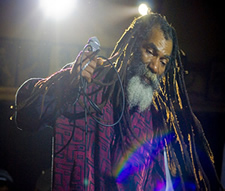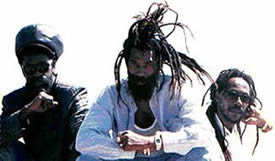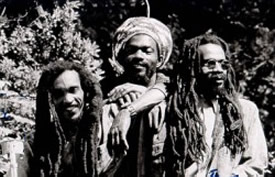
Don Carlos & Apple Gabriel Bios

Don Carlos
Euvin Spencer, aka Don Carlos, was born and raised in one of the most deprived regions of Western Kingston, Jamaica, in a district notoriously known as Waterhouse, which incidentally is also a musical spawning ground for many of Reggae's greatest ever talents, such as King Tubby, original member of Black Uhuru, The Jays, Junior Reid and King Jammy to name but a few, Don Carlos started his singing career back in 1973, as one of the original members of the aforementioned roots vocal group Black Uhuru. Alongside other founding members, Garth Dennis who later went on to joining the Wailing Souls and Derrick Ducky Simpson Uhuru's central figure, as part of the trio, Don played a prominent role in the recordings of the highly acclaimed Love Crisis album, for producer Prince Jammy in 1977. The said album was later re-released and re-titled as Black Sounds of Freedom. A year after the trio's ground breaking debut, Don Carlos surprisingly decided to part company in pursuit of a solo career. Having needed at least three years to get the grips of being a soloist, plus developing a knack for song writing and grooming that distinctive, vocal styling it wasn't until May 1981 that Carlos really took the fraternity by storm, courtesy of a heavy, roots and culture flavored show case album titled Suffering for Negus Roots.
Since then working alongside Goldie, his side kick, co writer and back up vocalist having built and consolidated a staunch following through touring the live circuit, plus 12 solo albums, most notably Harvest Time, Day to Day Living, Them Never Know a Natty Dread have credentials all three issued in 1982, Spread Out 1982 also otherwise known as Laser Beam to which the majority of tracks in this set have been culled, Never Run Away 1984, Just a Passing Glance 1985 and more recently Seven Days a Week a solid joint production venture, between Goldie, Dr. Dread and himself, there has been no turning back.
Although he reached the peak of his solo career during the heydays of the eighties dance hall mania thus celebrating his impact with five top ten hits between 1982 - 1985, Late Night Blues Nice Time Tonight, Dice Cup, Hog & Goat, I'm Not Getting Crazy and Spread Out The latter of which is included here, he is still churning out solid, melodic roots reggae. There's an old saying in the music industry that claims:  What goes around, comes back around. In Dons' case a request for reinstatement to his former role as lead vocalist for a rejuvenated Black Uhuru reunion resulted in a sadly underrated Now album. Amazingly he has been able to maintain dual roles of solo and group member efforts without inflicting a conflict of interest. It is an extremely rare feat if an artist's repertorire is built without a few mistakes along the way and up until the reunion of original Uhuru in 1990, Carlos' reputation suffered slightly from over exposure. During this exhaustive and hectic period, one of Jamaica's leading producers' of the 70's and 80's Bunny Striker Lee was able to coax some of the singer's finest moments by cleverly employing the rugged rhythm section of top sessions musicians like Sly & Robbie, the Roots Radics Band plus Santa and Ranchie. Biography by John Williams 8/1998
What goes around, comes back around. In Dons' case a request for reinstatement to his former role as lead vocalist for a rejuvenated Black Uhuru reunion resulted in a sadly underrated Now album. Amazingly he has been able to maintain dual roles of solo and group member efforts without inflicting a conflict of interest. It is an extremely rare feat if an artist's repertorire is built without a few mistakes along the way and up until the reunion of original Uhuru in 1990, Carlos' reputation suffered slightly from over exposure. During this exhaustive and hectic period, one of Jamaica's leading producers' of the 70's and 80's Bunny Striker Lee was able to coax some of the singer's finest moments by cleverly employing the rugged rhythm section of top sessions musicians like Sly & Robbie, the Roots Radics Band plus Santa and Ranchie. Biography by John Williams 8/1998
 Apple Gabriel
Apple Gabriel
Albert Craig aka Apple Gabriel (born early 1950’s) was raised in the Mona rehabilitation center in East Kingston and would become one of the most endearing voices in Roots Reggae music. Treated there since childhood until his sighting of Rastafari would cause the center to remove he and fellow Polio victims Cecil Spence “Skelly,” and Lascelle Bulgin “Wiss.” For a while Apple attended the famed Alpha Boy’s School and seemed destine for a future in music. At age 14 he felt disrespected and oppressed by the school’s authorities and ran away choosing a life of homelessness and poverty once again joining his childhood friends, Wiss and Skelly.
The three young teenage Rastaman would spend most of their time singing songs, reading the Bible, and meditating on the issues effecting Jamaican society. A popular Rasta movement known as the 12 Tribes of Israel taking root in Kingston in the early 1970’s brought the young singers under their wing. Together Apple, Skelly, and Wiss would take the name Israel Vibration and would help spread the message of Rastafari and Reggae music throughout the world.
Right from the start the group had a very distinguishable sound due in large part to Apple’s rhythmic pulse style of backing vocal harmonies, which he would later teach to Wiss, and Skelly solidifying the Israel Vibration sound. The group enjoyed huge worldwide success from their first album Same Song in 1978 until 1997’s Free To Move. Seeing the three polio survivors take the stage with their crutches and long dread locks along with the audience’s anticipation and amazement created a truly incredible moment.
Since 1997 Apple Gabriel has detached himself from his longtime friends do to friction as to the concept and overall direction of the group. Today Skelly and Wiss alone continue to tour and record as Israel Vibration. Apple has self-produced one solo album in 1999 and today struggles to get his music and message out to the people.
Apple has performed on the island on numerous occations and has collaborated with local artists like Millo Torres & El Tercer Planeta and Gomba Jahbari.